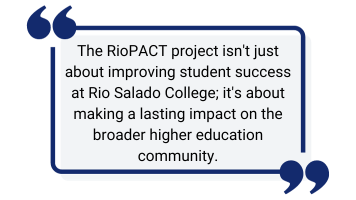RioPACT: Transforming Student Success at Rio Salado College
Published by: WCET | 10/12/2023
Tags: Digital Learning, Distance Education, Student Success, WCET, WCET Annual Conference, WCET Awards, WOW Award
Published by: WCET | 10/12/2023
Tags: Digital Learning, Distance Education, Student Success, WCET, WCET Annual Conference, WCET Awards, WOW Award

Each year, the goal of the WCET Awards Program is to highlight and showcase promising practices in higher education digital learning and to honor those who have dedicated their time and energies to our field.
It is an absolute honor for me to coordinate this program each year. One of my favorite aspects of this program is to work with the WCET Outstanding Work – WOW – Award winners.
From the beginning of our “awards season,” where we receive nominations and work with our amazing volunteer judges, I am always in awe of the nominated projects and initiatives. It’s amazing to learn about the innovative work happening on in higher education. This year it’s exciting to feature our three WOW Award recipients, but I also want to thank each of the individuals and teams that submitted a nomination this year. You’re all doing inspirational and important work and it was hard to narrow the nominations down to these three!
As we’ve announced, WCET will be awarding three WOW awards at this year’s WCET Annual Meeting. All this month and leading up to the Annual Meeting, WCET Frontiers will feature posts from our three selected recipients:
To kick off this year’s WOW Awardee series, we’re happy to welcome Zach Lewis and Dr. Fermin Ornelas from Rio Salado College to share about their award winning student success solution: RioPACT. Stay tuned for the rest of the month to learn about our other awardees. We’re looking forward to celebrating them at the Annual Meeting in New Orleans in just a few weeks!
Enjoy the read,
Lindsey Downs, WCET
In the ever-evolving landscape of higher education, institutions are constantly seeking innovative ways to support student success.

To accomplish our student retention and success goals here at Rio Salado College, we needed a way to identify students in need of intervention before they withdrew or dropped out, and off-the-shelf analytics solutions did not meet the needs of our learners. To address this challenge, we developed our own analytics tool that would empower our staff to assist and support our specific student population.
This journey led to the creation of RioPACT (Persistence and Completion Tracking), a predictive analytics tool designed to assess a student’s likelihood of persisting and continuing their studies. The RioPACT model analyzes three key areas:
RioPact is a tool that enables us to identify students in need of additional support. That information is provided to student-facing staff to intervene at the right moment to keep students on the path to degree or certification completion.

While commitment to student success and innovation is not new for Rio Salado, requirements for this specific tool and our college’s student body necessitated a different approach.
The majority of Rio’s learners are nontraditional: over 80 percent of our students attend part-time, nearly half are first-generation college students, and 40 percent have previously attempted higher education without success. The average student age is above 25 and we know many of our students are carrying multiple responsibilities as providers, caregivers and workers. We were determined to create a solution to meet the needs of our students and were able to leverage data captured in our in-house systems and applications to build a model attuned to Rio’s specific learner dynamics.
When the data model was initially developed, early results were highly promising, with a predictive accuracy rate of nearly 75 percent. RioPACT’s value, however, went beyond just the statistical significance and our early pilot underscored the potential for the tool. We first worked with the Office of Disability Resources and Services (DRS) last fall to further understand how to put the RioPACT to use. The 73 students who were identified as at higher risk for stop-out by RioPACT received interventions and additional support from DRS. When we reviewed student outcomes in the spring semester, over 52 percent of students who received treatment in the pilot persisted compared to 44 percent of students who did not receive any intervention. This was just a small sample of what could be achieved, but provided promising evidence that we were creating something that could have a much larger impact on our students.
As we move forward, we’re refining RioPACT and optimizing data capture to provide even better insights and just-in-time services to our students.

We’re scaling with a broader pilot this fall with the Office of Academic Advisement, not only to provide timely interventions to more students, but collect more data to evaluate, refine, and extend the tool. Furthermore, we have been awarded two research fellowships by the Strategic Data Project (SDP). The objective is to further enrich our skill set in data analytics and research methods as well as benefit from the expertise of the SDP alumni researchers.
The RioPACT project isn’t just about improving student success at Rio Salado College; it’s about making a lasting impact on the broader higher education community. We’re excited to share our findings and publish our work, knowing that it has the potential to benefit students and institutions far beyond our own.
In the end, RioPACT represents the power of innovation, dedication, and a commitment to student success. It’s a reflection of Rio Salado College’s mission to redefine the educational experience by anticipating the needs of our students.
Receiving the 2023 WOW Award from WCET for RioPACT is a remarkable honor. It signifies that WCET values the ability of community colleges like ours to generate valuable, homegrown solutions. This recognition encourages us to continue taking the lead in shaping our educational landscape.
Associate Dean of Institutional Research, Rio Salado College
Senior Research Analyst , Rio Salado College